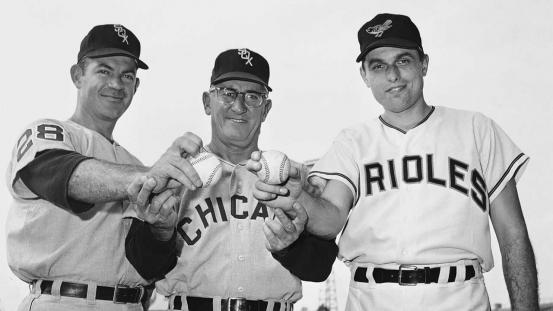- Commissioner’s statement on Ventura, Marte
- Ronnie O’Sullivan: Masters champion ‘felt so vulnerable’ in final
- Arron Fletcher Wins 2017 WSOP International Circuit Marrakech Main Event ($140,224)
- Smith challenges Warner to go big in India
- Moncada No. 1 on MLB Pipeline’s Top 10 2B Prospects list
- Braves land 2 on MLB Pipeline’s Top 10 2B Prospects list
- Kingery makes MLB Pipeline’s Top 10 2B Prospects list
- New Zealand wrap up 2-0 after Bangladesh implosion
- Mathews, Pradeep, Gunathilaka to return to Sri Lanka
- Elliott hopes for rain for Poli
Pappas so much greater than his legacy
- Updated: April 19, 2016

Milt Pappas was preparing to start a game against the Yankees early in the 1962 season when Baltimore columnist John Steadman asked him the kind of question ballplayers don’t always appreciate or even answer.
“How do you beat the Yankees?”
Pappas was 23 years old at the time and coming off three seasons in which he’d established himself as one of the American League’s better pitchers by winning 43 games for the Orioles.
To say he did not lack confidence would be an understatement. In fact, in those early days, a few of his teammates thought he might have been blessed with a bit too much.
• Former All-Star Pappas passes away at 76
Anyway, back to Steadman’s question about beating the Yankees, which not too many teams did in those days, especially the Orioles.
“If I pitch a shutout and hit a home run, we’ll probably win,” Pappas said confidently.
You can look up what happened next. On April 18, 1962, Pappas threw six shutout innings and hit a home run as the Orioles beat the Yankees, 1-0.
That story speaks volumes about the man who died Tuesday at 76. He will be most famously — and in many ways, unfairly — remembered for being part of something he had absolutely no control over: one of the most lopsided trades in baseball history.
After the 1965 season, the Orioles made Pappas the centerpiece of a deal that brought Frank Robinson to Baltimore. While Robinson led the Orioles to four American League pennants in six seasons and won the Triple Crown that first season, Pappas found himself stuck on a string of Reds teams that didn’t come close to the World Series.
And that trade should not be his legacy because the truth was Pappas had a very, very good career. He pitched 17 seasons in the big leagues and won …
continue reading in source mlb.mlb.com
